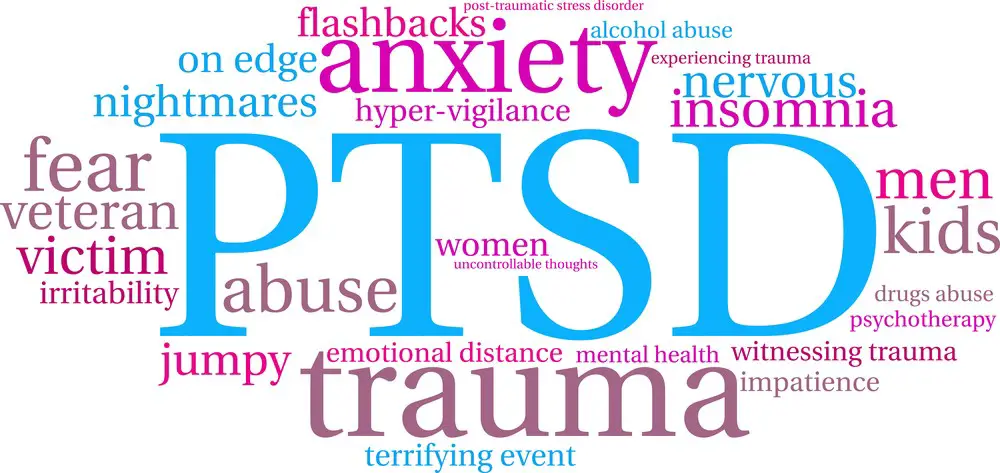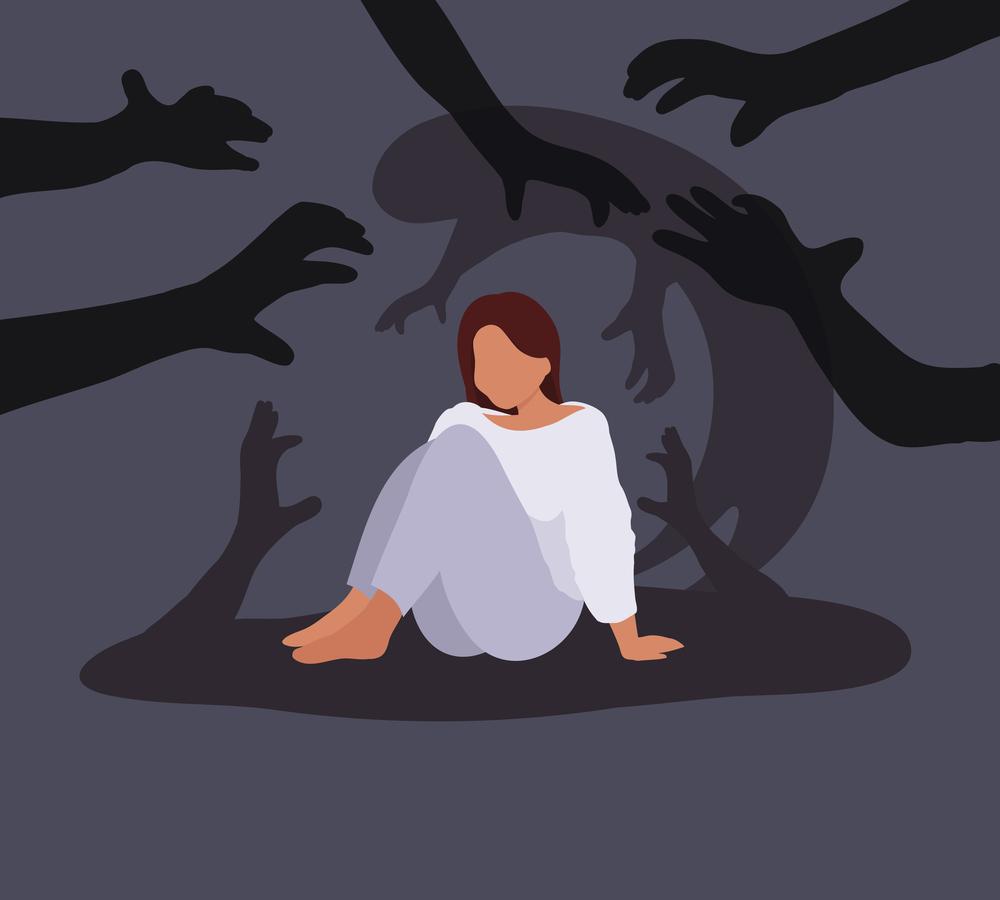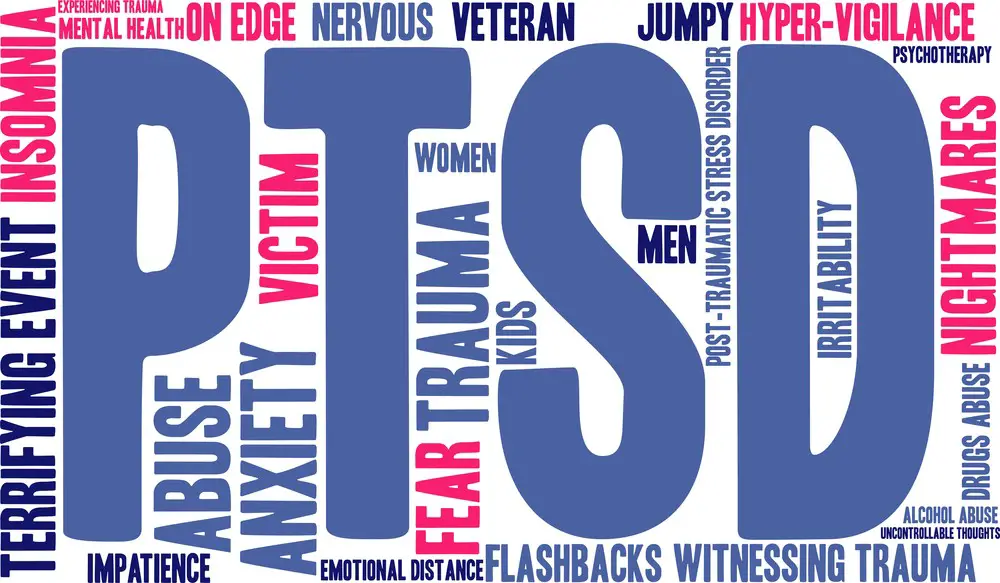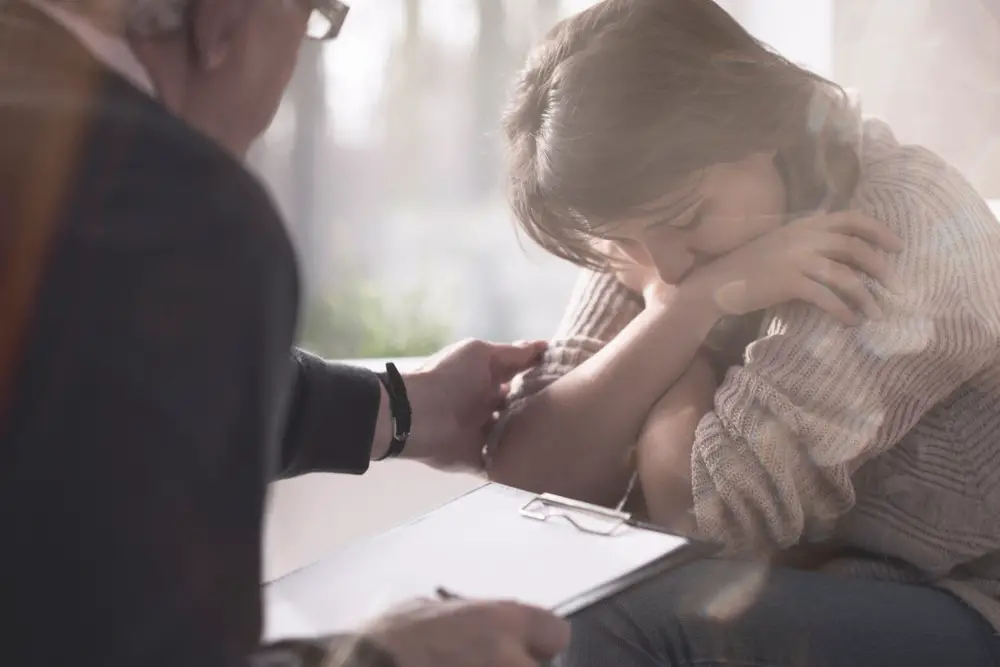As a BetterHelp affiliate, we receive compensation from BetterHelp if you purchase products or services through the links provided
Living with post-traumatic stress disorder (PTSD) is challenging, and understanding how to interact with and support someone suffering from PTSD can make a huge difference in their overall well-being. That being said, friends, family members, and acquaintances must be aware of the worst things they can do when attempting to offer solace. In this article, we’ll discuss harmful actions that can potentially exacerbate the effects of PTSD rather than alleviate them.
Knowing what not to do is as important as knowing how to provide appropriate support. Even seemingly harmless actions or statements might trigger past traumas and intensify their symptoms, worsening their situation instead of helping. Therefore, it’s essential for anyone wanting to assist someone with PTSD to learn about these pitfalls and avoid them at all costs.
Key Takeaways
- Be aware of actions and statements that can trigger past traumas and exacerbate PTSD symptoms.
- Avoid negative coping mechanisms and misconceptions when providing support
- Encourage patience, self-care, and mindfulness throughout the healing process
 Understanding PTSD
Understanding PTSD
Living with PTSD, or post-traumatic stress disorder, can be incredibly challenging. This mental health condition is triggered by experiencing or witnessing a traumatic event, which can leave you feeling fear, anxiety, and stress long after the event has passed.
It’s essential to recognize that PTSD is more than just having a hard time letting go of the past. Your brain’s natural response to trauma causes a chemical imbalance that can make it challenging to process stress and emotions healthily.
Some common symptoms of PTSD include:
- Flashbacks and vivid memories of the traumatic event
- Nightmares and difficulty sleeping
- Avoidance of situations, people, or places associated with the trauma
- Emotional numbness or detachment
- Irritability and anger outbursts
- Hypervigilance and being easily startled
When seeking to support someone with PTSD, it’s crucial to educate yourself about the condition. This can help you better understand what they are going through and how you can support them in their healing journey.
Here are some tips on how you can help:
- Be empathetic and nonjudgmental
- Encourage them to seek professional help and support them in finding the right mental health professional.
- Provide a safe and comfortable environment.
- Don’t force them to talk about the traumatic event, but be open and available to listen when they are ready
- Encourage self-care and healthy coping mechanisms, such as exercise, proper nutrition, and relaxation techniques
Remember that PTSD affects individuals differently, so it’s important to be patient and understanding. Your support can make a significant difference in their journey towards healing and recovery.
 Identifying PTSD Symptoms
Identifying PTSD Symptoms
Recognizing the signs of PTSD can be essential in providing proper support and understanding for someone who has experienced trauma. Here are the main symptoms to be aware of:
- Flashbacks: Sudden, vivid memories of the traumatic event that can feel like it’s happening all over again. You might notice the person seems disoriented or distressed for no apparent reason.
- Nightmares: Frightening, recurrent dreams related to their traumatic experience. The person may have difficulty sleeping due to the fear of these nightmares.
- Intrusive and distressing memories: When trauma-related thoughts and feelings intrude on a person’s daily life, causing discomfort and anxiety. They can find it hard to concentrate or complete tasks.
- Physiological reactions: The body can react to reminders of the traumatic event with increased heart rate, sweating, and tension. These intense reactions can impact a person’s comfort and ability to function.
- Depression: PTSD can lead to feelings of sadness, hopelessness, and a loss of interest in activities they used to enjoy.
- Panic: Feeling sudden, intense fear, even when there’s no immediate threat. A person may have difficulty breathing, a pounding heart, and feel dizzy or nauseous.
By being aware of these symptoms and understanding the challenges a person with PTSD faces, you can be more empathetic and supportive. Remember, everyone’s experience with PTSD is unique, so it’s essential to learn about these signs so you can best help those dealing with it.
 Impact on Relationships
Impact on Relationships
When dealing with PTSD, it’s essential to consider how it affects your relationships with others. The impact on relationships can be significant, with trust, communication, and isolation crucial issues.
You may find it difficult to trust others, as PTSD can make you feel vulnerable and unsure of people’s intentions. Rebuilding trust in relationships takes time and patience, but it’s essential for maintaining healthy connections. To rebuild trust, focus on open communication and mutual understanding.
Communication can be challenging when you have PTSD. You might struggle to express your thoughts clearly, leading to misunderstandings and relationship conflicts. To improve communication, try to be more mindful of your feelings and how you express them to others. Use assertive communication techniques, such as “I” statements, to avoid blame and express your needs clearly.
- Key takeaway: Practice open communication and mutual understanding to rebuild trust in relationships
Isolation is another issue you might face. Withdrawing from social situations or avoiding certain triggers can lead to a feeling of loneliness, making it harder to maintain connections. Being aware of your tendency to isolate yourself and finding ways to cope, such as seeking professional help or using support networks, is vital.
- Tips for coping with isolation:
- Reach out to friends and family for support
- Attend support groups or therapy sessions
- Engage in activities you enjoy, even if it’s just for a short time
Remember, nurturing relationships is critical for your mental health and overall well-being. By addressing trust, communication, and isolation issues, you can foster healthier relationships, even when dealing with PTSD.
- Key takeaway: Seek professional help and utilize support networks to cope with isolation
 The Trauma of Specific Experiences
The Trauma of Specific Experiences
Different traumatic events can trigger PTSD, and the severity and complexity of these events vary. While it’s important to remain compassionate and understanding, it’s crucial to be sensitive about specific experiences a person with PTSD has encountered. Here’s a look at some of the key experiences that people with PTSD might have faced:
Combat: Military personnel might have come across disturbing and life-threatening situations in war zones. They often witness their friends and teammates losing their lives, leaving them with a profound sense of loss and trauma.
Memories: Vivid and intrusive recollections of past traumas, also known as flashbacks, can transport someone with PTSD back to that horrifying event. Sounds, smells, or particular situations can trigger memories.
- Sexual assault: This type of assault can leave lasting psychological impacts on its victims, causing feelings of guilt, shame, and fear. Support for survivors should focus on reinforcing that they are not at fault and that their feelings are valid.
- Mugging: Being attacked or robbed on the street can instill a sense of helplessness and loss of safety that extends far beyond the initial event. Being mindful of their emotional state and working together to help cope with the fear and anxiety is beneficial.
- Terrorism: Those who have experienced a terrorist attack often experience a deep sense of distrust, paranoia, and intense fear. It’s important to recognize these feelings and lend an empathetic ear.
- Unexpected death: Losing a loved one suddenly and without warning can be incredibly disorienting and lead to intense grief. Offering support and understanding during this time is essential.
- Mass shootings: Survivors of mass shootings carry a heavy burden of shock, terror, and survivor’s guilt. They may struggle with understanding why they were spared while others were not, and these questions can cause immense distress.
Remember to be a kind, patient, and supportive listener to someone with PTSD. By making an effort to empathize and understand their unique experiences, you can help them navigate their journey toward healing.
The Dangers of Telling People to ‘Get Over It’
Telling someone with PTSD to “get over it” can be incredibly harmful and dismissive. It’s essential to recognize that for a person struggling with this condition, their traumatic experiences affect them deeply and are not something they can forget or move past without support.
When you tell someone to “get over it,” you’re likely unknowingly contributing to feelings of shame and guilt. They might begin to believe that their emotions and pain are unjustified, which only adds to the stigma surrounding mental health issues like PTSD. People with PTSD often face challenges in their daily lives that others can’t understand, and being told to “get over it” can make them feel isolated and overwhelmed.
Furthermore, such a statement can lead to increased frustration in people with PTSD. They may feel criticized for not being able to control their emotions and reactions to triggers, which can make their symptoms even worse. Putting pressure on them to “move on” could cause them to internalize that they’re not trying hard enough or are letting themselves down.
An important takeaway here is that you should never tell someone with PTSD to “get over it.” Instead, try offering a listening ear, compassion, and understanding. Encourage them to seek professional help if they haven’t already, and do your best to educate yourself on their challenges. By doing so, you become a more supportive friend or loved one, helping them through a difficult period without judgment.
Negative Coping Mechanisms
When it comes to managing PTSD, it’s essential to be aware of harmful coping mechanisms that might seem helpful initially but can worsen the situation. Let’s explore a few of these detrimental strategies so you can avoid them and seek healthier solutions.
First up is avoidance. It may be tempting to hide from situations or people that trigger your PTSD, but this will only reinforce your fear and anxiety. Instead, try gradually exposing yourself to situations that challenge your comfort zone, allowing you to build resilience over time. Remember, don’t force yourself into these situations, but instead take small steps towards confronting your triggers.
Substance abuse is another common pitfall. People with PTSD often turn to drugs or alcohol for temporary relief, but ultimately, substances can exacerbate your problems and hinder your progress. If you’re struggling with addiction, reach out for professional help or find a local support group. Replacing substance use with healthier coping techniques will make a world of difference in your overall well-being.
It’s also crucial to identify your triggers and learn how to manage them effectively. Avoiding triggers entirely isn’t always possible, so developing healthy coping mechanisms is key. You can try relaxation techniques, deep breathing exercises, or mindfulness practices to help you stay calm and focused in challenging situations.
- Don’t forget to communicate with loved ones about your triggers so they can provide support and make necessary adjustments to minimize your exposure.
You’re now armed with valuable information on harmful coping mechanisms. By steering clear of these pitfalls, you’re well on your way to building a healthier and more constructive path toward managing your PTSD. Keep exploring different strategies to find what works best for you.
 Missteps in Providing Support
Missteps in Providing Support
When you’re trying to support someone with PTSD, it’s essential to understand that your approach can significantly impact their overall well-being. Avoiding these missteps can help ensure that your support is beneficial, rather than harmful, to your loved one’s healing process:
- Ignoring their feelings or minimizing their experiences: You may not fully grasp the depth of their trauma, but it’s important to acknowledge their feelings and validate their experiences. Listen to their stories with empathy and refrain from making judgmental comments.
- Pushing them to talk prematurely: While open communication can be helpful for those with PTSD, forcing them to discuss their trauma before they’re ready could be counterproductive. Instead, let them know you’re there for them when they’re ready to talk. Be patient and understand they will open up at their own pace.
- Overloading them with advice: Although well-intended, inundating them with unsolicited advice might feel intrusive or dismissive. Instead, focus on being an active listener, allowing them to express their thoughts and emotions freely.
- Isolating them from their support system: Encourage them to expand their social support network and engage with family, friends, and community resources. Avoid creating a solely dependent relationship, which can sometimes lead to feelings of isolation.
Remember, offering support to someone with PTSD is an ongoing process that requires patience, understanding, and encouragement. By avoiding these missteps and being a respectful, empathetic listener, you can provide vital support in their journey toward healing and recovery.
Misconceptions About PTSD Treatments
It’s essential to be aware of common misconceptions about PTSD treatments and therapies. This knowledge can help you better support someone with PTSD and ensure they receive appropriate care.
Myth: All PTSD treatments are the same.
In reality, there are various treatment options for PTSD, including different therapies and medications. Your mental health professional can help you determine the most effective therapy or treatment for your situation.
Myth: Only medication can help people with PTSD.
While medications can be helpful for some, there are non-pharmacological therapies also available. Cognitive-behavioral therapy, exposure therapy, and eye movement desensitization and reprocessing (EMDR) are examples of alternative treatments.
Myth: Immediate treatment is necessary to prevent PTSD.
Many people believe that immediate intervention after a traumatic event can prevent the development of PTSD. However, early intervention doesn’t guarantee prevention. It’s essential to consult with a mental health professional to determine the appropriate course of action for your unique circumstances.
To support someone with PTSD effectively, it’s crucial to:
- Avoid making assumptions about their treatment or therapy preferences
- Encourage them to seek professional help and consultation
- Be patient and understanding as they navigate their treatment journey
Remember, everyone’s experience with PTSD is different, and their recovery path may not be linear. By dispelling misconceptions about PTSD treatments and therapies, you can provide better support during their healing process.
 The Importance of Patience in the Healing Process
The Importance of Patience in the Healing Process
We all know that healing from PTSD can be a long and challenging journey. During this time, it’s crucial to practice patience with yourself and those around you. Remember, everyone’s healing process is unique and may involve a series of setbacks and recovery periods.
Don’t forget to give yourself credit for the progress you’ve made. It’s natural to have ups and downs while working through PTSD, and recognizing these moments is essential in fostering patience during your healing process. When setbacks occur, remind yourself that it’s a normal part of the journey. Keep in mind:
- Allow time for healing: Understand that recovery can’t be rushed. It takes time to process your traumas and rebuild your emotional strength.
- Celebrate small victories: Acknowledge your accomplishments, no matter how minor they may seem. Every step forward matters and contributes to your long-term recovery.
Being patient with those around you is just as important. Your loved ones might not always understand what you’re going through, but they want to support you in any way they can. Keep an open line of communication and let them know how they can help. Here are some things to consider:
- Educate others: Share information about PTSD and your experiences. This will help create empathy and understanding among your support network.
- Set boundaries: Communicate your limits and preferences. This is crucial in maintaining healthy relationships throughout your recovery process.
Finally, remember that patience is a skill that needs to be nurtured and developed. Like any other aspect of your healing process, it takes regular effort and practice. Don’t be too hard on yourself; learning to cultivate patience is a vital element of your journey toward healing.
 The Role of Self-Care and Mindfulness in PTSD
The Role of Self-Care and Mindfulness in PTSD
When dealing with PTSD, it’s important to prioritize self-care and practice mindfulness regularly. These habits can be integral to your well-being and help in managing the symptoms of PTSD.
Self-care is crucial in maintaining a positive mental and physical state. Focus on your needs and set aside some time for activities you enjoy. It could be reading a book, walking, or just having a cup of tea while listening to your favorite music. Self-care also includes taking care of your physical health. Eating well, exercising, and getting enough sleep are essential to maintaining a healthy lifestyle.
Mindfulness is a powerful coping mechanism for individuals with PTSD. Being present and aware of your thoughts, feelings, and physical sensations can help you gain a sense of control over your symptoms. To practice mindfulness, take a few moments each day to focus on your breath or body sensations. Pause what you’re doing, find a comfortable position, and observe your thoughts without judgment. This practice of non-judgmental awareness can lead to a calmer and more focused state of mind.
Here are a few strategies to help you develop these skills:
- Establish a daily self-care routine and stick to it
- Try out different mindfulness techniques (breathing exercises, meditation, yoga, etc.) to find what works best for you
- Set realistic and achievable goals for your self-care plan
- Recognize your unique strengths and abilities and be proud of them
- Reach out to a support network of friends, family, or a therapist to discuss your feelings and experiences
Incorporating self-care and mindfulness into your daily routine can provide numerous benefits:
- Reduction in stress and anxiety
- Better emotional regulation and resilience
- Enhanced mental clarity and focus
- Improved quality of sleep
Be kind to yourself, and remember that self-care and mindfulness are valuable tools in managing PTSD. Give yourself the necessary time and space to heal and grow, and be patient with your progress as you work towards a healthier, happier life.
Understanding C-PTSD: A Deeper Layer of Trauma
When discussing PTSD, it’s crucial to recognize a related but distinct condition known as Complex PTSD (C-PTSD). This form of trauma arises from prolonged exposure to distressing situations, often over months or years, such as chronic abuse, captivity, or repetitive domestic violence.
Unlike PTSD, which can result from a single event, C-PTSD involves deeper emotional wounds that can affect a person’s self-identity and the way they relate to others. Those with C-PTSD may experience additional symptoms such as difficulties with emotional regulation, a persistent sense of hopelessness, and complex relationship issues.
In your journey to support someone with PTSD, be especially sensitive to the possibility of C-PTSD. The support required can be more intricate, demanding an even greater level of patience, understanding, and specialized care. Encouraging professional support and being there for the long haul can make a significant difference in their healing process. Remember, while the path to recovery can be more challenging with C-PTSD, with the right support and resources, resilience and recovery are within reach.
Frequently Asked Questions
What should you avoid saying to a person with PTSD?
When speaking with someone with PTSD, be mindful of your words. Avoid statements like:
- “Just get over it.”
- “It’s all in your head.”
- “You’re just being dramatic.”
- “Why can’t you just move on?”
These comments can be hurtful and dismissive and can make symptoms worse. Instead, offer a listening ear and empathetic support.
What are common triggers in relationships for someone with PTSD?
Triggers can vary for individuals with PTSD, but some common ones in relationships include:
- Arguments or conflict
- Extreme emotional reactions
- Touch or physical closeness
- Feeling confined or isolated
- Reminders of past trauma (e.g., certain smells, sounds, or locations)
Being mindful of these triggers can help both partners navigate the relationship more effectively.
How can you help someone during a PTSD attack?
When a person with PTSD experiences an attack, consider the following tips for support:
- Remain calm and patient.
- Encourage them to focus on deep breathing.
- Ask if they need space or physical comfort.
- Help ground them by pointing out their surroundings.
- Remind them that they’re safe in the present moment.
What makes PTSD symptoms worse?
Several factors can exacerbate PTSD symptoms:
- Lack of sleep or poor sleep quality
- Substance misuse, such as alcohol or drugs
- High stress levels
- Additional trauma or triggers
To mitigate these factors, a person with PTSD should focus on maintaining a healthy lifestyle and seeking professional help when needed.
Which coping skills are unhealthy for dealing with PTSD?
Unhealthy coping skills for PTSD include:
- Avoiding social situations or potential triggers
- Overusing substances (drugs, alcohol)
- Suppressing emotions instead of addressing them
- Engaging in self-harming behaviors
Utilizing healthier coping skills, like therapy, exercise, and support networks, can lead to improved emotional well-being.
How to support a partner with PTSD in a relationship?
Supporting a partner with PTSD requires empathy, patience, and open communication. Consider these strategies:
- Learn about PTSD to better understand their experiences.
- Encourage them to seek professional help, if they haven’t already.
- Be a reliable and non-judgmental listener.
- Establish boundaries and respect triggers.
- Celebrate progress and remind them of their strengths.
By implementing these strategies, you can help your partner navigate their PTSD symptoms and build a healthier, stronger relationship.
- Stress Management: What is the Relationship Between Stress and Addiction? - June 28, 2024
- Exploring Techniques to Maintain a Healthy Lifestyle without Drugs - May 28, 2024
- How Acupuncture Helps Treat Chronic Fatigue Syndrome - May 28, 2024
This site contains affiliate links to products. We will receive a commission for purchases made through these links.


 Understanding PTSD
Understanding PTSD Identifying PTSD Symptoms
Identifying PTSD Symptoms Impact on Relationships
Impact on Relationships The Trauma of Specific Experiences
The Trauma of Specific Experiences Missteps in Providing Support
Missteps in Providing Support The Importance of Patience in the Healing Process
The Importance of Patience in the Healing Process The Role of Self-Care and Mindfulness in PTSD
The Role of Self-Care and Mindfulness in PTSD

